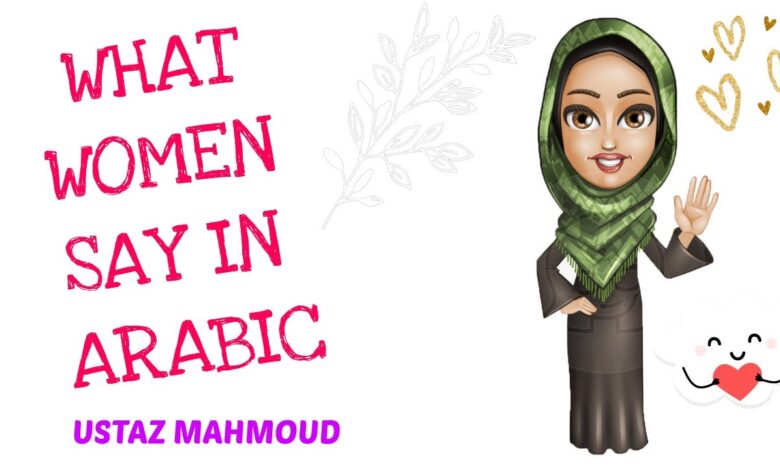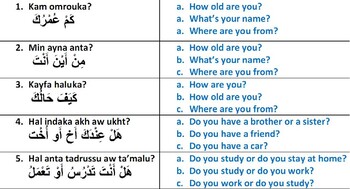Conversation Starters to Use When Chatting with Arab Women


Introduction
Overview of Conversation Starters to Use When Chatting with Arab Women
When interacting with Arab women, it is essential to be mindful of cultural nuances and respectful communication. In conversations with Arab women, initiating dialogue with common topics such as family, culture, or food can help establish a connection. Asking open-ended questions about their interests or experiences can also demonstrate genuine interest in getting to know them better. Avoid sensitive topics such as politics or religion unless the woman initiates such discussions. It is crucial to show appreciation for their culture and traditions while engaging in conversation.
Key Tips for Effective Communication
| Tip | Description |
|---|---|
| Be respectful and courteous | Show respect for their beliefs, traditions, and opinions. |
| Listen actively | Pay attention to their responses and show genuine interest in what they have to say. |
| Use simple and clear language | Avoid using slang or complex jargon to ensure effective communication. |
| Maintain eye contact | Demonstrate attentiveness and sincerity by maintaining eye contact during conversations. |
| Be mindful of non-verbal cues | Pay attention to body language, gestures, and facial expressions to gauge their reactions and emotions. |
| Show empathy and understanding | Try to put yourself in their shoes and respond empathetically to their experiences or feelings. |
| Avoid interrupting or dominating | Allow them to express themselves without interruption and give them space to share their thoughts. |

Compliments
Authentic Compliments to Use When Chatting with Arab Women
When engaging in conversations with Arab women, offering genuine compliments can help establish a positive connection. Complimenting their traditional attire, such as their abaya or hijab, can show appreciation for their culture and style. Praising their hospitality or culinary skills, especially if you have experienced them firsthand, can also be well-received. Acknowledging their intelligence, creativity, or accomplishments can convey admiration and respect for their achievements. Remember to be sincere and specific in your compliments to make them impactful and heartfelt.
Dos and Don’ts of Giving Compliments
When giving compliments to Arab women, it is important to be mindful of cultural sensitivities and norms. Do express appreciation for their efforts, talents, or qualities in a respectful and considerate manner. Avoid compliments that may be perceived as overly personal or intrusive, especially regarding physical appearance or private matters. Ensure that your compliments are genuine and relevant to the context of your conversation. Remember that sincerity and authenticity are key when giving compliments to Arab women.

Cultural Topics
Engaging Cultural Topics for Conversation with Arab Women
When conversing with Arab women, discussing cultural topics can foster connection and mutual understanding. Bringing up topics such as traditional Arab cuisine, music, art, or literature can be engaging and show interest in their culture. Sharing experiences or insights about local customs, celebrations, or familial traditions can also lead to meaningful exchanges. Respectfully asking questions about their cultural background or experiences can demonstrate curiosity and a desire to learn more about their heritage.
Respecting Cultural Sensitivities
It is essential to be mindful of cultural sensitivities when interacting with Arab women. Showing respect for their beliefs, values, and traditions is crucial in building positive relationships. Avoiding sensitive topics such as politics, religion, or personal relationships unless the conversation naturally progresses in that direction is advisable. Being open-minded, empathetic, and considerate of their cultural practices and societal norms is key to fostering a harmonious and respectful interaction.

Travel and Adventure
Discussing Travel and Adventure with Arab Women
When engaging with Arab women in conversations about travel and adventure, it is important to consider topics that resonate with their interests. Sharing experiences of exploring different cultures, trying exotic cuisines, or embarking on thrilling adventures can spark engaging discussions. Expressing curiosity about their favorite travel destinations, dream vacations, or bucket list adventures can also deepen the conversation and create a shared sense of wanderlust.
Sharing Travel Experiences and Dream Destinations
Arab women may appreciate discussions about travel experiences that align with their values and preferences. By sharing stories of meaningful encounters, unique destinations visited, or memorable journeys undertaken, you can connect on a personal level and inspire a sense of exploration. Expressing interest in their dream destinations, future travel plans, or adventurous aspirations can also facilitate a vibrant exchange of ideas and create a bond based on mutual fascination with the beauty and diversity of the world.

Food and Cuisine
Exploring Food and Cuisine Conversations with Arab Women
When engaging in conversations about food and cuisine with Arab women, focusing on topics that appeal to their culinary interests is key. Discussing the richness of traditional Arab dishes, the significance of ingredients, and the cultural importance of specific meals can lead to engaging dialogues. Showing appreciation for the various flavors, spices, and cooking methods commonly used in Arab cuisine can also enhance the conversation and foster a shared passion for gastronomy.
Popular Dishes and Cooking Techniques
Arab women may enjoy conversing about popular dishes that hold special meaning in their culture. From savory classics like Mansaf and Kabsa to sweet delights like Baklava and Kunafa, each dish carries a unique story and flavor profile. Exploring the culinary techniques involved in creating these beloved dishes, such as slow cooking, marinating, and baking, can provide insight into the intricate art of Arab cooking. Expressing interest in learning recipes, discovering hidden gems of the local culinary scene, or exchanging cooking tips can further deepen the connection through a shared love for food.

Fashion and Style
Conversation Starters about Fashion and Style with Arab Women
When engaging in discussions about fashion and style with Arab women, sparking conversations on topics that resonate with their sartorial interests is essential. Delving into preferences for traditional attire, color choices, favorite designers, and personal styling tips can create engaging dialogues. Showing admiration for the intricate embellishments, fabrics, and craftsmanship common in Arab fashion can also deepen the conversation and nurture a mutual appreciation for creative expression through clothing.
Trends and Traditional Clothing
Arab women may enjoy sharing insights on current fashion trends alongside traditional clothing styles that hold cultural significance. From elegant Abayas and Thobes to vibrant Kaftans and intricate embroidery patterns, each garment tells a story rooted in heritage. Exploring the fusion of modern fashion trends with traditional attire, discussing styling techniques, and exchanging fashion advice can provide a platform for mutual exploration and celebration of diverse fashion sensibilities.

Family and Relationships
Topics on Family and Relationships for Conversations with Arab Women
When conversing with Arab women about family and relationships, engaging in discussions on topics that are significant to them is key. Exploring themes such as the importance of family bonds, traditions surrounding marriage and child-rearing, and the role of extended family members can lead to meaningful interactions. Delving into personal experiences and cultural practices related to familial relationships can foster a deeper understanding and appreciation of the values that shape familial dynamics.
Understanding Family Dynamics and Traditions
Arab women often have rich insights into their family dynamics and traditions that are deeply rooted in cultural heritage. By listening attentively to their narratives about familial hierarchies, societal expectations, and the significance of family gatherings, one can gain a deeper understanding of their perspectives on kinship and interconnectedness. Reflecting on the shared values of respect, support, and solidarity within Arab families can pave the way for insightful conversations about the evolving roles of women in familial contexts.

Family and Relationships
Topics on Family and Relationships for Conversations with Arab Women
When conversing with Arab women about family and relationships, it is important to delve into topics that hold significance to them. Discussing themes such as the importance of family bonds, traditions related to marriage and child-rearing, and the roles of extended family members can lead to meaningful interactions. Exploring personal experiences and cultural practices concerning familial relationships can foster a deeper understanding and appreciation of the values that influence family dynamics.
Understanding Family Dynamics and Traditions
Arab women often offer invaluable insights into their family dynamics and traditions, which are deeply rooted in cultural heritage. Attentively listening to their stories about familial hierarchies, societal expectations, and the importance of family gatherings allows for a more profound comprehension of their views on kinship and interconnectedness. Reflecting on shared values such as respect, support, and solidarity within Arab families can pave the way for insightful discussions about the changing roles of women in family settings.
Hobbies and Interests
Discovering Hobbies and Interests of Arab Women
Exploring the hobbies and interests of Arab women can provide a glimpse into their individuality and passions. Understanding what activities bring them joy and fulfillment can offer insights into their personalities and preferences. Engaging in conversations about hobbies also allows for a deeper connection and shared experiences.
Common Recreational Activities and Hobbies
Among Arab women, common recreational activities and hobbies may include art, cooking, reading, sports, gardening, or volunteer work. These pursuits not only serve as sources of enjoyment but also as avenues for personal growth and self-expression. Sharing interests and engaging in mutual hobbies can strengthen relationships and create lasting bonds among individuals.

Family and Relationships
Topics on Family and Relationships for Conversations with Arab Women
When communicating with Arab women about family and relationships, it is crucial to address topics that are significant to them. Discussing themes such as the importance of family bonds, traditions related to marriage and child-rearing, and the roles of extended family members can lead to meaningful interactions. Exploring personal experiences and cultural practices concerning familial relationships can foster a deeper understanding and appreciation of the values that influence family dynamics.
Understanding Family Dynamics and Traditions
Arab women often provide valuable insights into their family dynamics and traditions deeply embedded in cultural heritage. Attentively listening to their stories about familial hierarchies, societal expectations, and the importance of family gatherings allows for a more profound comprehension of their views on kinship and interconnectedness. Reflecting on shared values such as respect, support, and solidarity within Arab families can pave the way for insightful discussions about the changing roles of women in family settings.
Hobbies and Interests
Discovering Hobbies and Interests of Arab Women
Exploring the hobbies and interests of Arab women can provide a glimpse into their individuality and passions. Understanding what activities bring them joy and fulfillment can offer insights into their personalities and preferences. Engaging in conversations about hobbies also allows for a deeper connection and shared experiences.
Common Recreational Activities and Hobbies
Among Arab women, common recreational activities and hobbies may include art, cooking, reading, sports, gardening, or volunteer work. These pursuits not only serve as sources of enjoyment but also as avenues for personal growth and self-expression. Sharing interests and engaging in mutual hobbies can strengthen relationships and create lasting bonds among individuals.




